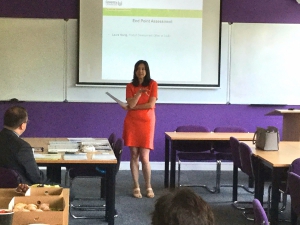10 things we learned at Coventry University: The Nationwide Apprenticeship University Business Breakfast Briefing
On Wednesday 21 June, Coventry University: The Nationwide Apprenticeship University hosted a business breakfast briefing at the Coventry Business School, as an opportunity for employers to find out more about Higher and Degree Apprenticeships.
Here’s 10 things we learned from the briefing:
- Levy-paying employers get a 10% top-up by government to their monthly funds, in addition to their money back.
For example:
- An employer pays a Levy of £12,000 annually
- Each month £1000 is paid into that employer’s account
- Top up: 10% x £1,000 = £100 per month
- Levy monthly account: £1,000 + £100 =£1,100
- £13,200 annually to spend on training and assessment of apprentices
- Non Levy-paying employers can still get funding for apprentices through co-investment from the government
- 90% of the cost of training and assessment of apprentices is paid by the government
- Co- investment also applies if you are a levy-paying employer with insufficient funds in your digital account
- the government will pay 90% of the balance up to the funding limit for that apprenticeship
- A study by ICM Research reveals that employers in England rate qualified higher apprentices as 25% more employable than those who took an alternative route into work
- Gov.uk states that 90% of apprentices stay in employment after finishing their apprenticeship
- Chartered Management Institute (CMI) research has proven that Chartered Managers each add £391K of value to their employers
- Apprentices must work a minimum of 30 hours a week (excluding lunch break) and the maximum is 40 hours for 16-18 year olds and 48 hours for 19 years and over.
- For Chartered Legal Executive Apprentices who study with Coventry University: The Nationwide Apprenticeship University, there are three options available to their employers:
- The apprentice can be released for one day a week, or
- Two evenings a week, or
- Be released for a block of days once a month to complete the knowledge part of the apprenticeship.
- During their apprenticeship, they will be taught in several ways:
- Active learning – A large variety of teaching methods during face to face interactive sessions
- Personal development with one-to-one tutorial support
- Virtual Learning – an interactive zone where you can find course materials, information and forums
- August 2020 will be last chance to start the traditional route to the profession of solicitor.
From September 2020, anyone wanting to become a solicitor will have to pass the Solicitors’ Qualifying Examination (SQE). This is a new, standardised assessment which all solicitors will be required to take before they are accepted as qualified. It will be in two stages:
- Functioning legal knowledge assessments
- Practical legal skills assessments
We will be hosting more Business Breakfast Briefings in the coming months, and look forward to seeing you there.
For more information, please visit Coventry University: The Nationwide Apprenticeship University , or chat to a member of our team by calling 02477 654 960 or emailing us at info@apprenticeship-university.co.uk
